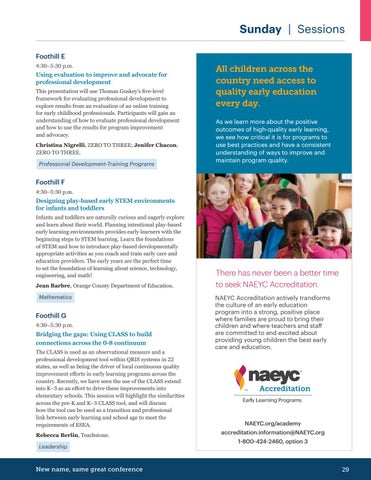Sunday | Sessions Foothill E 4:30–5:30 p.m.
Using evaluation to improve and advocate for professional development This presentation will use Thomas Guskey’s five-level framework for evaluating professional development to explore results from an evaluation of an online training for early childhood professionals. Participants will gain an understanding of how to evaluate professional development and how to use the results for program improvement and advocacy. Christina Nigrelli, ZERO TO THREE; Jenifer Chacon, ZERO TO THREE. Professional Development-Training Programs
All children across the country need access to quality early education every day. As we learn more about the positive outcomes of high-quality early learning, we see how critical it is for programs to use best practices and have a consistent understanding of ways to improve and maintain program quality.
Foothill F 4:30–5:30 p.m.
Designing play-based early STEM environments for infants and toddlers Infants and toddlers are naturally curious and eagerly explore and learn about their world. Planning intentional play-based early learning environments provides early learners with the beginning steps to STEM learning. Learn the foundations of STEM and how to introduce play-based developmentally appropriate activities as you coach and train early care and education providers. The early years are the perfect time to set the foundation of learning about science, technology, engineering, and math! Jean Barbre, Orange County Department of Education. Mathematics
Foothill G 4:30–5:30 p.m.
Bridging the gaps: Using CLASS to build connections across the 0-8 continuum The CLASS is used as an observational measure and a professional development tool within QRIS systems in 22 states, as well as being the driver of local continuous quality improvement efforts in early learning programs across the country. Recently, we have seen the use of the CLASS extend into K–3 as an effort to drive these improvements into elementary schools. This session will highlight the similarities across the pre-K and K–3 CLASS tool, and will discuss how the tool can be used as a transition and professional link between early learning and school age to meet the requirements of ESEA. Rebecca Berlin, Teachstone. Leadership
New name, same great conference
There has never been a better time to seek NAEYC Accreditation. NAEYC Accreditation actively transforms the culture of an early education program into a strong, positive place where families are proud to bring their children and where teachers and staff are committed to and excited about providing young children the best early care and education.
NAEYC.org/academy accreditation.information@NAEYC.org 1-800-424-2460, option 3
29
